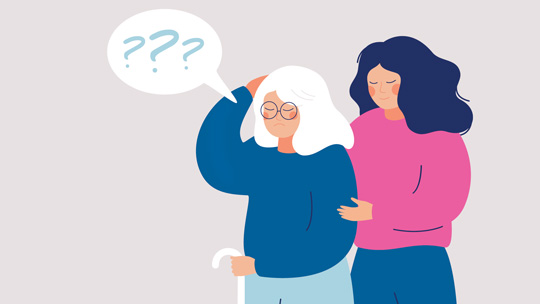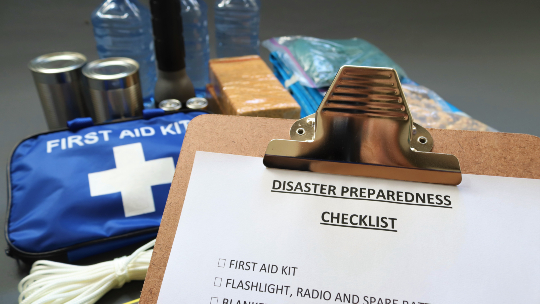Father Time likes to leave little reminders that we’re getting older. A few new gray hairs sprout up seemingly overnight. The smile lines around your mouth deepen. You begin to experience new aches and pains after a few hours on your feet.
As bothersome as wrinkles and a sore back may be, they are natural parts of aging.
So when you begin forgetting scheduled appointments and losing your train of thought mid-sentence, you assume this, too, is just part of life. It’s what happened to your mother and to her father and grandfather.
But marked changes in memory, attention, communication, problem-solving, even your personality and behavior, are not normal.
They could be signs of dementia.

We all suffer from memory lapses now and again. But when forgetfulness begins to impair reasoning, judgement, or your ability to do everyday tasks, you should speak with your primary care provider for medical advice.
Defining dementia
The Centers for Disease Control and Prevention (CDC) identifies dementia as the deterioration in one’s ability to remember, think, or make decisions to the point that one cannot complete basic daily activities.
The condition stems from the death of nerve cells in the brain. Called neurons, these cells communicate with each other to transmit information throughout your entire body. When once-healthy cells stop working, you lose your ability to remember and perform everyday tasks.
Everyone will experience some loss of neurons in their lifetime, but those with dementia experience a far greater loss.
|
Normal Signs of Aging |
Possible Signs of Dementia |
|
Forgetting where you parked your car. |
Forgetting where you live. |
|
Waking up and thinking it’s Friday (but eventually realizing it’s Thursday). |
Waking up and thinking it’s the wrong month or year (and not figuring out the correct date on your own). |
|
Having trouble finding the right word to use from time to time. |
Struggling to carry on a conversation. |
|
Feeling upset after a stressful day. |
Feeling overwhelmed and anxious for no reason when you’re normally easygoing. |
|
Retelling a story from a few weeks ago. |
Retelling a story from a few minutes ago. |
|
Trying to remember if you turned off the stove. |
Trying to remember how to use the stove. |
|
Walking into a room and forgetting why you went there. |
Walking into a room and forgetting where you are or how you got there. |
Should I be worried?
Dementia can develop for a variety of reasons and include varying symptoms depending on where in the brain the nerve cells die. In fact, it isn’t unusual for people to have more than one type of dementia at the same time.
You’ve likely heard of the most common cause of dementia and have probably even used the two terms interchangeably.
Alzheimer’s disease describes a progressive brain disorder that destroys memory and thinking skills.
First recognized by Dr. Alois Alzheimer in 1906, Alzheimer’s disease today affects about a third of people age 85 and older. However, symptoms can begin to appear in one’s mid-60s.
In Hawaii, more than 29,000 people currently live with Alzheimer’s disease. That number is anticipated to reach 35,000 by 2025.
The State Task Force on Alzheimer’s Disease and Related Dementias – a partnership between the Hawaii executive Office on Aging and the Alzheimer’s Association, Aloha Chapter – correlates the rapid rise in Alzheimer’s diagnoses with Hawaii’s high percentage of older adults, noting that the fastest growing segment of the state’s population is those 65 and older.
Signs to recognize
Memory loss is the most recognizable sign of Alzheimer’s onset. Other symptoms to watch for include:
- Vision/spatial issues.
- Impaired reasoning or judgment.
- Mild cognitive impairment (MCI).
- Difficulty doing daily tasks (e.g., cooking a meal, driving a car, getting dressed).
- Getting lost or disoriented easily.
- Changes in personality (e.g., becoming anxious, angry, or violent).
Alzheimer’s disease is irreversible and though treatment can help, there is no cure.

Confusion, disorientation, or a marked change in a loved one's personality could signal the onset of Alzheimer's disease.
What increases my risk?
Heredity (the genes you inherit from your parents) plays a large role in the likelihood you’ll develop dementia. But a family history of the condition (or lack thereof) doesn’t determine your destiny. Other risk factors include:
- Obesity.
- Heart disease.
- Diabetes.
- High blood pressure.
- High cholesterol.
- Tobacco use.
- Traumatic head injuries.
- Lack of sleep.
Managing memory loss
To manage dementia or prevent memory loss as you age, experts recommend the following:
- Consume a heart-healthy diet rich in vegetables, fruits, fish, whole grains, and fats from sources like avocados, olive oil, and nuts.
- Get in regular physical activity most days of the week for at least 30 minutes. Exercise doesn’t need to be strenuous. Your activity can be brisk walking, swimming, hiking, gardening, or playing with your grandchildren.
- Play mind games, like crossword puzzles or Sudoku, to challenge your thinking and keep your neurons firing.
- Be social! Look for opportunities to stay involved in your community.

Your gardening habit may be doing more for you than you think! Staying physically active helps keep both mind and muscles strong as you age. Regular movement like walking, swimming, and even gardening count as exercise when done for 30 minutes most days of the week.
Remember – some forgetfulness as you age isn’t cause for concern. But noticeable changes in memory, reasoning, and mood may be signs of something more serious. Talk with your primary care provider if you have questions or concerns about dementia.
Learn more about dementia and read a poem by A.J. Fortin.




